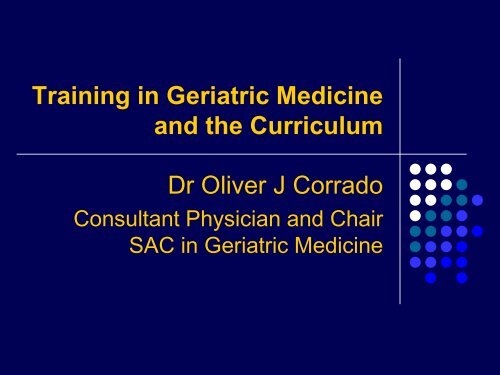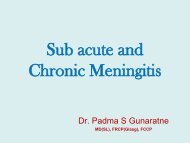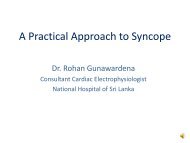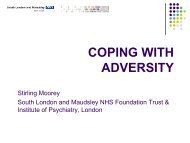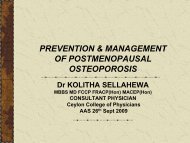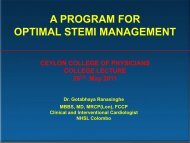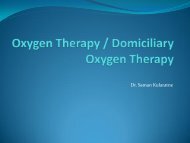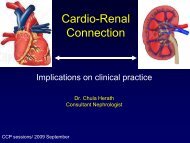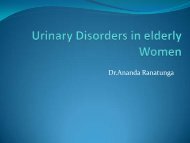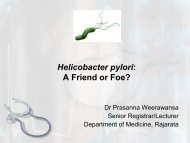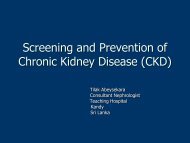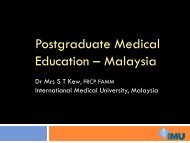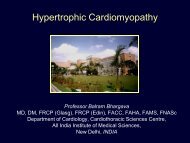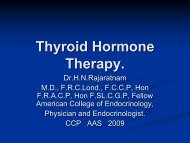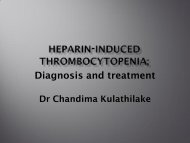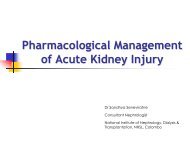Training in Geriatric Medicine and the Curriculum Dr Oliver J Corrado
Training in Geriatric Medicine and the Curriculum Dr Oliver J Corrado
Training in Geriatric Medicine and the Curriculum Dr Oliver J Corrado
You also want an ePaper? Increase the reach of your titles
YUMPU automatically turns print PDFs into web optimized ePapers that Google loves.
<strong>Tra<strong>in</strong><strong>in</strong>g</strong> <strong>in</strong> <strong>Geriatric</strong> Medic<strong>in</strong>e<br />
<strong>and</strong> <strong>the</strong> <strong>Curriculum</strong><br />
<strong>Dr</strong> <strong>Oliver</strong> J <strong>Corrado</strong><br />
Consultant Physician <strong>and</strong> Chair<br />
SAC <strong>in</strong> <strong>Geriatric</strong> Medic<strong>in</strong>e
• Background <strong>in</strong>formation<br />
• The <strong>Tra<strong>in</strong><strong>in</strong>g</strong> Pathway <strong>in</strong> <strong>Geriatric</strong> Medic<strong>in</strong>e<br />
• The Higher <strong>Tra<strong>in</strong><strong>in</strong>g</strong> (Registrar) <strong>Curriculum</strong> <strong>in</strong> <strong>Geriatric</strong><br />
Medic<strong>in</strong>e<br />
• The Specialist Certificate Exam<strong>in</strong>ation (SCE)<br />
<strong>in</strong> <strong>Geriatric</strong> Medic<strong>in</strong>e
The Start of <strong>Geriatric</strong> Medic<strong>in</strong>e<br />
• 1936 <strong>Dr</strong> Marjory Warren<br />
• Isleworth workhouse, with<br />
rehab <strong>and</strong> equipment<br />
discharged many residents<br />
• Advocated creat<strong>in</strong>g <strong>the</strong><br />
specialty ‘<strong>Geriatric</strong>s’<br />
• 1948 NHS appo<strong>in</strong>ted first<br />
consultants
Consultant Numbers <strong>in</strong> UK by Specialty (2009)<br />
Specialty<br />
Consultants <strong>in</strong> UK<br />
<strong>Geriatric</strong> Medic<strong>in</strong>e 1205<br />
Gastroenterology 995<br />
Respiratory 859<br />
Cardiology 856<br />
Haematology 843<br />
Diabetes <strong>and</strong> Endo 742<br />
Rheumatology 640<br />
Neurology 633
Registrar Numbers <strong>in</strong> UK by Specialty<br />
Specialty<br />
Registrars <strong>in</strong> UK<br />
Cardiology 685<br />
Respiratory 624<br />
<strong>Geriatric</strong> Medic<strong>in</strong>e 607<br />
Gastroenterology 555<br />
Diabetes <strong>and</strong> Endo 405
<strong>Tra<strong>in</strong><strong>in</strong>g</strong> Pathways <strong>in</strong> Medical Specialties<br />
• 2005 major change <strong>in</strong> UK postgraduate tra<strong>in</strong><strong>in</strong>g<br />
‘Modernis<strong>in</strong>g Medical Careers’<br />
‘Old System’<br />
1 year : Pre-registration House Officer<br />
(6 months medic<strong>in</strong>e <strong>and</strong> 6 months surgery)<br />
2-3years: Medical SHO tra<strong>in</strong><strong>in</strong>g obta<strong>in</strong> MRCP<br />
Then<br />
: Registrar <strong>Tra<strong>in</strong><strong>in</strong>g</strong> (variable period, 5 years<br />
for dual tra<strong>in</strong><strong>in</strong>g <strong>in</strong> <strong>Geriatric</strong> <strong>and</strong> GIM)
<strong>Tra<strong>in</strong><strong>in</strong>g</strong> Pathways <strong>in</strong> Medical Specialties<br />
‘New System’<br />
2 year m<strong>and</strong>atory:<br />
Foundation <strong>Tra<strong>in</strong><strong>in</strong>g</strong> before GP or specialty tra<strong>in</strong><strong>in</strong>g.<br />
(6 posts of 4 months, different specialties <strong>and</strong> sett<strong>in</strong>gs)<br />
Work place based assessment of competence<br />
2-3 years: Core Medical or Acute Care Common Stem<br />
tra<strong>in</strong>ee (similar to SHO) obta<strong>in</strong> MRCP (at least<br />
Part 1)<br />
Then:<br />
Specialty Registrar tra<strong>in</strong><strong>in</strong>g 5 yrs to complete for<br />
<strong>Geriatric</strong> <strong>and</strong> GIM <strong>and</strong> obta<strong>in</strong> CCT
The <strong>Curriculum</strong><br />
• Foundation (generic not specialty specific)<br />
• Core Medical (for all medical specialties)<br />
• Higher Specialist (Registrar) <strong>Tra<strong>in</strong><strong>in</strong>g</strong><br />
(specialty specific)
The <strong>Geriatric</strong> Medic<strong>in</strong>e Registrar <strong>Curriculum</strong><br />
Aim of <strong>the</strong> curriculum is to provide <strong>the</strong> tra<strong>in</strong>ee with<br />
necessary, knowledge, skills <strong>and</strong> behaviours to<br />
practise as a specialist <strong>in</strong> geriatric medic<strong>in</strong>e <strong>in</strong> any<br />
cl<strong>in</strong>ical sett<strong>in</strong>g:<br />
• Undertake comprehensive assessment of an older<br />
person, <strong>in</strong>clud<strong>in</strong>g mood, cognition, gait <strong>and</strong> nutrition<br />
• Diagnose <strong>and</strong> manage acute illness <strong>in</strong> old age<br />
• Diagnose <strong>and</strong> manage patients with chronic disease<br />
<strong>and</strong> disability<br />
• Supervise older patients’ rehabilitation with a<br />
multidiscipl<strong>in</strong>ary team
The <strong>Geriatric</strong> Medic<strong>in</strong>e Registrar <strong>Curriculum</strong><br />
• Discharge plann<strong>in</strong>g<br />
• Provide appropriate care to those <strong>in</strong> long term (cont<strong>in</strong>u<strong>in</strong>g care) <strong>in</strong><br />
<strong>the</strong> NHS or community<br />
• Have <strong>the</strong> skills to manage patients <strong>in</strong> a community or <strong>in</strong>termediate<br />
care sett<strong>in</strong>g<br />
• Assess <strong>and</strong> manage older patients present<strong>in</strong>g with common<br />
geriatric problems <strong>in</strong>clud<strong>in</strong>g<br />
• Falls with or without fracture<br />
• Delirium<br />
• Incont<strong>in</strong>ence<br />
• Poor mobility
The <strong>Geriatric</strong> Medic<strong>in</strong>e Registrar <strong>Curriculum</strong><br />
• To demonstrate competence <strong>in</strong> <strong>the</strong> follow<strong>in</strong>g topics:<br />
• Palliative care<br />
• Orthogeriatrics<br />
• Old Age Psychiatry <strong>in</strong>clud<strong>in</strong>g dementia <strong>and</strong> depression<br />
• Stroke care (acute <strong>and</strong> rehabilitation) <strong>and</strong> TIAs<br />
• Movement disorders eg Park<strong>in</strong>son’s disease<br />
• Underst<strong>and</strong> pr<strong>in</strong>ciples of health promotion, nutrition, tissue<br />
viability, homeostasis <strong>and</strong> <strong>the</strong>rmoregulation<br />
• Generic skills: Medical Leadership, team work<strong>in</strong>g, communication,<br />
Patient Safety, medical ethics
Assess<strong>in</strong>g Competence: Work Place Based<br />
Assessments (WPBAs)<br />
Tra<strong>in</strong>ees’ competence assessed us<strong>in</strong>g a variety of work place based<br />
assessments:<br />
• Multi-source feedback (MSF)<br />
Assesses generic skills such as communication, leadership <strong>and</strong> team<br />
work<strong>in</strong>g. Feedback of a tra<strong>in</strong>ee’s performance from different health<br />
professionals.<br />
• M<strong>in</strong>i-Cl<strong>in</strong>ical Evaluation Exercise (M<strong>in</strong>i-CEX)<br />
Evaluates a patient cl<strong>in</strong>ical encounter to assess competence <strong>in</strong> skills<br />
such as history tak<strong>in</strong>g, exam<strong>in</strong>ation. Can be used <strong>in</strong> any sett<strong>in</strong>g.<br />
• Direct Observation of Procedural Skills (DOPS)<br />
Evaluate ability to undertake practical procedures, not as relevant <strong>in</strong><br />
<strong>Geriatric</strong> Medic<strong>in</strong>e)
Assess<strong>in</strong>g Competence: Work Place Based<br />
Assessments (WPBAs)<br />
• Case-based Discussion (CbD)<br />
Assesses competence <strong>in</strong> areas such as cl<strong>in</strong>ical reason<strong>in</strong>g,<br />
decision-mak<strong>in</strong>g <strong>and</strong> application of knowledge to patient care.<br />
• Acute Care Assessment Tool (ACAT)<br />
Assesses a doctor's performance dur<strong>in</strong>g <strong>the</strong>ir practice on <strong>the</strong><br />
Acute Medical Take.<br />
• Patient Survey (PS)<br />
• Audit Assessment (AA)<br />
• Teach<strong>in</strong>g Observation (TO)<br />
WPBAs entail a lot of work for consultants!
Specialty Certificate Exam<strong>in</strong>ations (SCEs)<br />
• SCEs <strong>in</strong>troduced by <strong>the</strong> Federation of Royal Colleges of<br />
Physicians for larger medical specialties <strong>in</strong> 2008<br />
(Cardiology organis<strong>in</strong>g its own exam)<br />
To ensure that certified specialists have sufficient<br />
knowledge of <strong>the</strong>ir specialty to practice safely <strong>and</strong><br />
competently as consultants<br />
• SCE is taken after MRCP (UK) generally 3 rd /4 th year of<br />
Registrar tra<strong>in</strong><strong>in</strong>g<br />
• Gastroenterology first specialty to hold exam <strong>in</strong> 2008,<br />
<strong>Geriatric</strong> Medic<strong>in</strong>e <strong>the</strong> second March 2009
Specialty Certificate Exam<strong>in</strong>ations (SCEs)<br />
• The SCE is ‘bluepr<strong>in</strong>ted’ aga<strong>in</strong>st <strong>the</strong> <strong>Curriculum</strong> <strong>in</strong><br />
<strong>Geriatric</strong> Medic<strong>in</strong>e<br />
• The SCE is a computer-based two-paper test with a total<br />
of 200 questions. Each paper conta<strong>in</strong>s 100 questions<br />
<strong>and</strong> lasts three hours. Questions are based on <strong>the</strong><br />
MRCP(UK) ‘best of five’ multiple choice question format.
SCE Sample ‘Best of Five’ Questions<br />
Sample questions for many specialties available free<br />
via MRCPuk.org site<br />
http://www.mrcpuk.org/SCE/Specialties<br />
Free onl<strong>in</strong>e educational resource with <strong>Geriatric</strong> Medic<strong>in</strong>e<br />
questions (Educational Resource on Age<strong>in</strong>g (ERA)) hosted<br />
by University of Dundee<br />
http://www.dundee.ac.uk/learn<strong>in</strong>g/era/era<strong>in</strong>dex.htm
SCE Example ‘Best of Five’ Questions<br />
An 82-year-old woman had a 3 year history of ur<strong>in</strong>ary frequency, with a<br />
sudden desire to ur<strong>in</strong>ate at times associated with <strong>in</strong>cont<strong>in</strong>ence, but no<br />
dysuria. She was on no medication <strong>and</strong> <strong>the</strong>re were no abnormal<br />
f<strong>in</strong>d<strong>in</strong>gs on exam<strong>in</strong>ation. Mid stream ur<strong>in</strong>e specimen was negative.<br />
The most likely cause for her symptoms is:<br />
A atonic bladder<br />
B autonomic neuropathy<br />
C overflow <strong>in</strong>cont<strong>in</strong>ence<br />
D overactive bladder syndrome<br />
E pelvic floor weakness<br />
Answer: ?
SCE Example ‘Best of Five’ Questions<br />
An 82-year-old woman had a 3 year history of ur<strong>in</strong>ary frequency, with a<br />
sudden desire to ur<strong>in</strong>ate at times associated with <strong>in</strong>cont<strong>in</strong>ence, but no<br />
dysuria. She was on no medication <strong>and</strong> <strong>the</strong>re were no abnormal<br />
f<strong>in</strong>d<strong>in</strong>gs on exam<strong>in</strong>ation. Mid stream ur<strong>in</strong>e specimen was negative.<br />
The most likely cause for her symptoms is:<br />
A atonic bladder<br />
B autonomic neuropathy<br />
C overflow <strong>in</strong>cont<strong>in</strong>ence<br />
D overactive bladder syndrome<br />
E pelvic floor weakness<br />
Answer: D
SCE Example ‘Best of Five’ Questions<br />
An 84-year-old man had a 3 year progressive decl<strong>in</strong>e <strong>in</strong> memory. His<br />
wife was now hav<strong>in</strong>g to help him dress <strong>and</strong> said that for 2 years he had<br />
seen ‘animals <strong>and</strong> people which were not <strong>the</strong>re’ <strong>and</strong> that his gait had<br />
become ‘shuffly’. He had slight rigidity <strong>in</strong> his upper limbs <strong>and</strong> his<br />
M<strong>in</strong>i Mental State Exam<strong>in</strong>ation MMSE was 19/30.<br />
Rout<strong>in</strong>e bloods, CXR, ECG <strong>and</strong> MSU were all normal.<br />
What is <strong>the</strong> most likely diagnosis?<br />
A Alzheimer’s disease<br />
B Lewy body dementia<br />
C Low pressure hydrocephalus<br />
D Neurosyphilis<br />
E Vascular dementia<br />
Answer: ?
SCE Example ‘Best of Five’ Questions<br />
An 84-year-old man had a 3 year progressive decl<strong>in</strong>e <strong>in</strong> memory. His<br />
wife was now hav<strong>in</strong>g to help him dress <strong>and</strong> said that for 2 years he had<br />
seen ‘animals <strong>and</strong> people which were not <strong>the</strong>re’ <strong>and</strong> that his gait had<br />
become ‘shuffly’. He had slight rigidity <strong>in</strong> his upper limbs <strong>and</strong> his MMSE<br />
was 19/30. Rout<strong>in</strong>e bloods, CXR, ECG <strong>and</strong> MSU were all normal.<br />
What is <strong>the</strong> most likely diagnosis?<br />
A Alzheimer’s disease<br />
B Lewy body dementia<br />
C Low pressure hydrocephalus<br />
D Neurosyphilis<br />
E Vascular dementia<br />
Answer: B
SCE Example ‘Best of Five’ Questions<br />
Human progeria syndromes are considered to represent a human<br />
model of accelerated age<strong>in</strong>g<br />
What is <strong>the</strong> most characteristic feature observed <strong>in</strong> this condition?<br />
A cardiovascular disease <strong>in</strong> teenage years<br />
B cataract formation<br />
C cognitive decl<strong>in</strong>e<br />
D normal weight ga<strong>in</strong> <strong>in</strong> <strong>in</strong>fant years<br />
E osteoarthritis<br />
Answer: ?
SCE Example ‘Best of Five’ Questions<br />
Human progeria syndromes are considered to represent a human<br />
model of accelerated age<strong>in</strong>g<br />
What is <strong>the</strong> most characteristic feature observed <strong>in</strong> this condition?<br />
A cardiovascular disease <strong>in</strong> teenage years<br />
B cataract formation<br />
C cognitive decl<strong>in</strong>e<br />
D normal weight ga<strong>in</strong> <strong>in</strong> <strong>in</strong>fant years<br />
E osteoarthritis<br />
Answer: A
Thank You <strong>and</strong> Questions?


